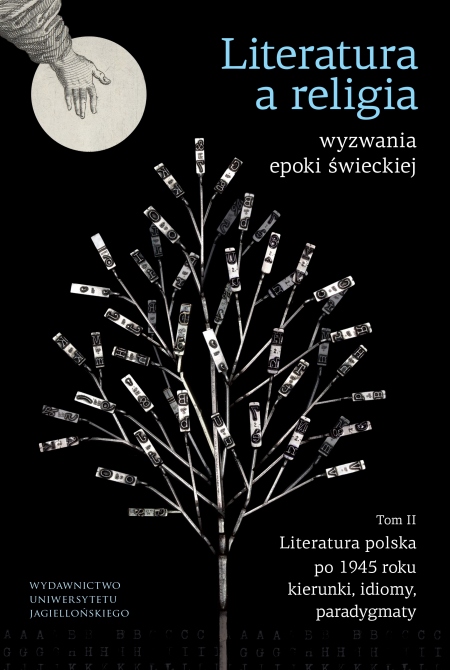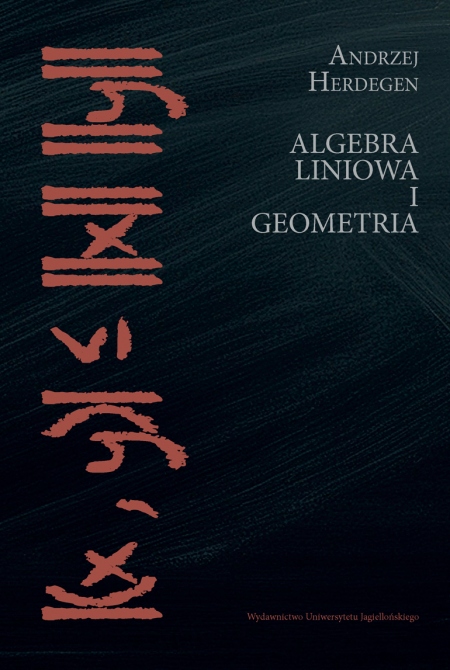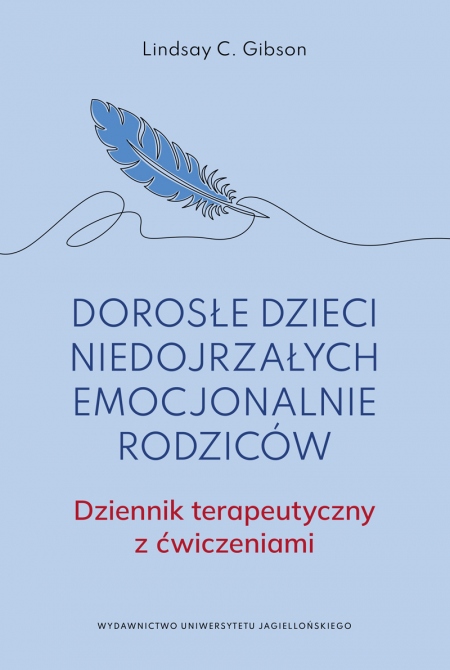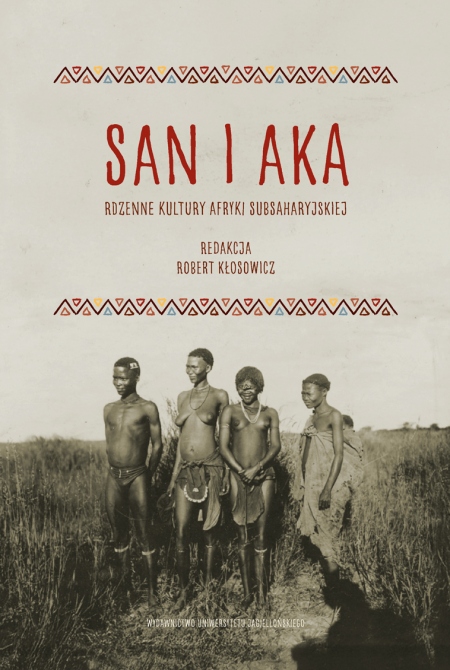Events over Endeavours
Image of the Chinese in Zambia and Angola
Edited by: Jarosław Jura, Kaja Kałużyńska, Paulo de Carvalho
Series: Chińskie Drogi
Pages: 186
Book format: 15,8x23,5 cm
Publish date: 15.05.2015
Book description
The contemporary Chinese engagement in Africa dates back to the 1950's, and it has gained momentum in the last two decades. The Chinese presence in African countries has been getting more and more visible; not only the number of Chinese investments in the area and international agreements has been increasing, but also the size of the Chinese diaspora in the region has grown.
China has been looking for new sources of natural resources and markets on which the 'made in China' goods would be welcomed, therefore it spares no efforts to establish and maintain possibly good relationships with Africa, especially with political elites of African countries. At first, the Chinese expansion was supported by the country's image of an older brother, a co-victim of the Western domination, and a example to be followed on the the path leading to development. This image, however, has started to be covered with some spots and shadows, caused by various Chinese activities. In this book we aimed to sketch the image of China and the Chinese in Zambia and Angola, presented by textual media and citizens of these countries, and to trace the most important factors influencing it. Moreover, we brought up some possible consequences of the prevalence of a particular – positive or negative – image for the future development of the Chinese expansion in the region. To obtain the possibly detailed image, we decided to combine quantitative and qualitative analysis of media content with results of our field work conducted in Africa.
The study is focused on the extraordinarily important topical problem of the Chinese expansion in Africa. Both the applied innovative methodology and the new approach towards the Sino-African relations, focused on the perception of the Chinese presence in the region, are the factors that distinguish this work. [...]
As the authors themselves state, in the summary they try to avoid drawing generalising conclusions; rather, they focus on pointing out the differences in the perception of China and the Chinese between Angola and Zambia. Acknowledging the increasing importance of the perception of China and the Chinese in Africa as an important factor influencing Sino-African relations constitutes the most valuable conclusion of the study.
Jarostaw Jura is president of the Institute of Socio-Economic Enquiry. He obtained his PhD in sociology from the University of Warsaw. Among his research interests there are sociology of communication, social anthropology, quantitative analysis of qualitative data, as well as social issues of contemporary China and Chinese expansion in Africa. He is an author and co-author of numerous publications, including: J. Jura, K. Kałużyńska, Not Confucius, nor Kung Fu. Economy and Business as Chinese Soft Power in Africa, "African East-Asian Affairs. The Asian Monitor", Issue 1, March 2013; J. Jura, Eating and Drinking Interactions Patterns and Social Women Role Transformation in Contemporary Urban China, "Polish Sociological Review", Issue 3, 2009.
Kaja Kałużyńska is a PhD student at National Chengchi University in Taiwan. She obtained her MA degrees in Chinese Philosophy at Xiamen University and Far Eastern Cultures at the Jagiellonian University (Krakow). Co-author of: J. Jura, K. Kałużyńska, Perception of China and Chinese among Users of Zambian Internet Forums, in: A. Zemanek (ed.), Media in China, China in the Media. Processes, Strategies, Images, Identities, Jagiellonian University Press, Krakow 2014; J. Jura, K. Kałużyńska, Not Confucius, nor Kung Fu. Economy and Business as Chinese Soft Power in Africa, "African East-Asian Affairs. The Asian Monitor", Issue 1, March 2013. Her research interests include social change in contemporary rural China, media images, and development and application of data mining techniques.
Paulo de Carvalho is Professor at the Agostinho Neto University (UAN) and vice-president of the Council of Pan-African University (since 2015). He obtained his MA in sociology at the Warsaw University and PhD at the ISCTE (Lisbon, Portugal). Previously President of the Katyavala Bwila University and Director of the Agostinho Neto University Faculty of Arts and Social Sciences. Researcher at the Center for Research and Studies in Sociology of the UAN Faculty of Social Sciences (Luanda, Angola) and editor of "Revista Angolana de Sociologia". Among his research interests there are social marginalization, poverty, political sociology, standards of consumption, ethnic relations, crime and media audience. Author of 9 books on sociology
China has been looking for new sources of natural resources and markets on which the 'made in China' goods would be welcomed, therefore it spares no efforts to establish and maintain possibly good relationships with Africa, especially with political elites of African countries. At first, the Chinese expansion was supported by the country's image of an older brother, a co-victim of the Western domination, and a example to be followed on the the path leading to development. This image, however, has started to be covered with some spots and shadows, caused by various Chinese activities. In this book we aimed to sketch the image of China and the Chinese in Zambia and Angola, presented by textual media and citizens of these countries, and to trace the most important factors influencing it. Moreover, we brought up some possible consequences of the prevalence of a particular – positive or negative – image for the future development of the Chinese expansion in the region. To obtain the possibly detailed image, we decided to combine quantitative and qualitative analysis of media content with results of our field work conducted in Africa.
The study is focused on the extraordinarily important topical problem of the Chinese expansion in Africa. Both the applied innovative methodology and the new approach towards the Sino-African relations, focused on the perception of the Chinese presence in the region, are the factors that distinguish this work. [...]
As the authors themselves state, in the summary they try to avoid drawing generalising conclusions; rather, they focus on pointing out the differences in the perception of China and the Chinese between Angola and Zambia. Acknowledging the increasing importance of the perception of China and the Chinese in Africa as an important factor influencing Sino-African relations constitutes the most valuable conclusion of the study.
Prof. Dominik Mierzejewski, Department of East Asian Studies, University of Lodz
Jarostaw Jura is president of the Institute of Socio-Economic Enquiry. He obtained his PhD in sociology from the University of Warsaw. Among his research interests there are sociology of communication, social anthropology, quantitative analysis of qualitative data, as well as social issues of contemporary China and Chinese expansion in Africa. He is an author and co-author of numerous publications, including: J. Jura, K. Kałużyńska, Not Confucius, nor Kung Fu. Economy and Business as Chinese Soft Power in Africa, "African East-Asian Affairs. The Asian Monitor", Issue 1, March 2013; J. Jura, Eating and Drinking Interactions Patterns and Social Women Role Transformation in Contemporary Urban China, "Polish Sociological Review", Issue 3, 2009.
Kaja Kałużyńska is a PhD student at National Chengchi University in Taiwan. She obtained her MA degrees in Chinese Philosophy at Xiamen University and Far Eastern Cultures at the Jagiellonian University (Krakow). Co-author of: J. Jura, K. Kałużyńska, Perception of China and Chinese among Users of Zambian Internet Forums, in: A. Zemanek (ed.), Media in China, China in the Media. Processes, Strategies, Images, Identities, Jagiellonian University Press, Krakow 2014; J. Jura, K. Kałużyńska, Not Confucius, nor Kung Fu. Economy and Business as Chinese Soft Power in Africa, "African East-Asian Affairs. The Asian Monitor", Issue 1, March 2013. Her research interests include social change in contemporary rural China, media images, and development and application of data mining techniques.
Paulo de Carvalho is Professor at the Agostinho Neto University (UAN) and vice-president of the Council of Pan-African University (since 2015). He obtained his MA in sociology at the Warsaw University and PhD at the ISCTE (Lisbon, Portugal). Previously President of the Katyavala Bwila University and Director of the Agostinho Neto University Faculty of Arts and Social Sciences. Researcher at the Center for Research and Studies in Sociology of the UAN Faculty of Social Sciences (Luanda, Angola) and editor of "Revista Angolana de Sociologia". Among his research interests there are social marginalization, poverty, political sociology, standards of consumption, ethnic relations, crime and media audience. Author of 9 books on sociology
Language
English
Edition
first
Edited by
Jarosław Jura
, Kaja Kałużyńska
, Paulo de Carvalho
Cover design
Ewa Skrzypiec
ISBN: 978-83-233-3840-6
e-ISBN (pdf): 978-83-233-9242-2
Country of producer: Poland
RECOMMENDED BOOKS
NEW BOOKS
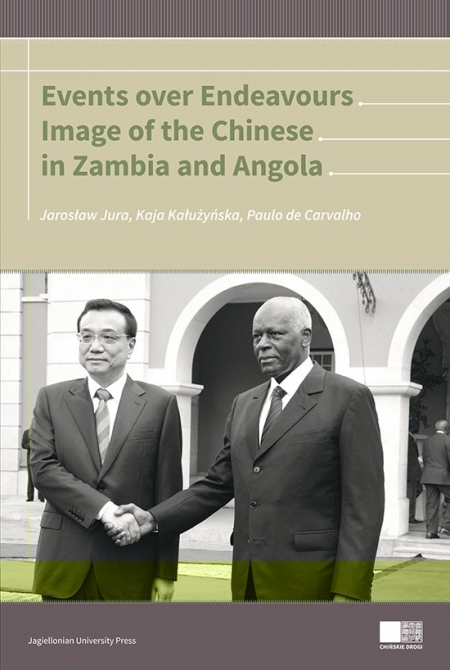
Events over Endeavours
Image of the Chinese in Zambia and Angola
TABLE OF CONTENTS
Introduction 7
1. Chinese expansion in the past and nowadays 11
5. Image of China and the Chinese in Zambia and Angola – field work results 111
Appendix 169
Reference list 173
Subject index 181
Index of names 183
1. Chinese expansion in the past and nowadays 11
1.1. Chinese traditional expansion model 122. Image of the China and the Chinese in Africa 31
1.2. Chinese expansion in Africa 19
2.1. State of play – empirical studies results overview 313. China and Chinese in Zambian and Angolan media 63
2.2. Image of China and the Chinese in Zambia and Angola – problem justification 49
2.3. National image concept 53
4. Image of China and the Chinese among Zambian netizens’ 973.1. Quantitative analysis of media content 67
3.2. Mixed method codes analysis 75
3.2.1. Negative categories analysis 76
3.2.2. Positive categories analysis 87
5. Image of China and the Chinese in Zambia and Angola – field work results 111
5.1. Field work in Zambia 1136. Summary 155
5.2. Field work in Angola 125
Appendix 169
Reference list 173
Subject index 181
Index of names 183
Events over Endeavours
Image of the Chinese in Zambia and Angola
TABLE OF CONTENTS
Introduction 7
1. Chinese expansion in the past and nowadays 11
5. Image of China and the Chinese in Zambia and Angola – field work results 111
Appendix 169
Reference list 173
Subject index 181
Index of names 183
1. Chinese expansion in the past and nowadays 11
1.1. Chinese traditional expansion model 122. Image of the China and the Chinese in Africa 31
1.2. Chinese expansion in Africa 19
2.1. State of play – empirical studies results overview 313. China and Chinese in Zambian and Angolan media 63
2.2. Image of China and the Chinese in Zambia and Angola – problem justification 49
2.3. National image concept 53
4. Image of China and the Chinese among Zambian netizens’ 973.1. Quantitative analysis of media content 67
3.2. Mixed method codes analysis 75
3.2.1. Negative categories analysis 76
3.2.2. Positive categories analysis 87
5. Image of China and the Chinese in Zambia and Angola – field work results 111
5.1. Field work in Zambia 1136. Summary 155
5.2. Field work in Angola 125
Appendix 169
Reference list 173
Subject index 181
Index of names 183
Choose chapters to buy:
Order value:
0.00 zł


